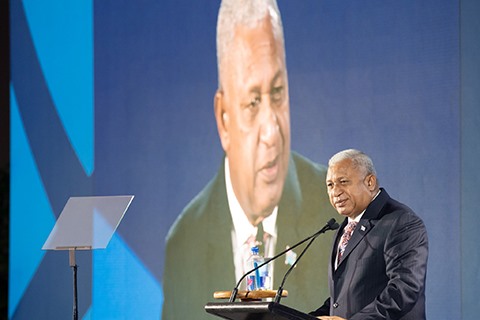 Economy
Economy

Asian Development Bank (ADB) has called on the member countries to move together in “one wave” and support the multilateral system for the future of Asia and the Pacific region.

|
Fiji’s Prime Minister Josaia Voreqe Bainimarama
By Mai Huong
NADI — The Asian Development Bank (ADB) has called on member countries to move together in “one wave” and support a multilateral system for the future of Asia and the Pacific region.
This statement, made by ADB President Takehiko Nakao in the opening session of the 52nd ADB Annual Meeting on May 3 in Fiji, was in harmony with this year’s theme “Prosperity through Unity”.
“I’m a firm believer in the multilateral system, which includes multilateral development banks such as ADB,” Nakao said, confirming national interests and multilateralism went hand in hand.
“Because multilateral development banks leverage taxpayers’ money by tapping capital markets, they can efficiently and effectively support poverty reduction, invest in infrastructure, address climate change and provide other global and regional public goods.”
In an agreement, Fiji’s Prime Minister Josaia Voreqe Bainimarama described Fiji as a successful case study in harnessing the power of unity to create inclusive and wide-reaching prosperity.
The host of this meeting – a nation of just 900,000 people – has enjoyed economy expansion ten straight years, a new record for Fiji. The economy of this South Pacific island increased 3 per cent each in the last two years, and is forecast to expand 3.2 per cent in 2019 and 3.5 per cent in 2020.
“Achieving unity takes trust, it takes respect and it takes mutual understanding.
“On the international stage, unity is forged by the ethos of multilateralism. And as history has shown us, unity, driven by a multilateral approach, is the key to global prosperity,” PM Bainimarama said.
Solid economic growth
Despite rising uncertainties in the global economy, economic growth in the region remained solid, supported by domestic consumption and investment, the ADB President said.
“Countries need to continue to pursue prudent macro-economic policies, implement structural reforms and invest in human capital and infrastructure,” Nakao said.
ADB forecasts the region will expand by 5.7 per cent this year. Excluding the newly high-income industrialised economies (Hong Kong, Republic of Korea, Singapore and Taipei), Asia and the Pacific is expected to grow 6.2 per this year and 6.1 per cent in 2020.
Mainland China is projected to grow at 6.3 per cent for the year while India’s growth will remain solid at 7.2 per cent.
Southeast Asia will sustain growth at close to 5 per cent this year and next. Growth is expected to be 4.2 per cent this year in Central Asia and 3.5 per cent in the Pacific.
However, he also pointed out trade tensions remained a concern. If tensions escalated, they could seriously undermine consumer and investor confidence and weaken growth in the region.
“Maintaining open trade and investment regimes is key to vibrant and sustainable growth. In this respect, the ongoing efforts by Asian governments to promote new multilateral trade agreements within the region and beyond are encouraging,” Nakao said.
Also at the meeting, he highlighted six areas the ADB considered essential to the success of its Strategy 2030 as well as better response to the changing needs of the region.
They include addressing poverty and inequality; accelerating progress in gender equality; climate mitigation and adaption efforts; continued support for regional co-operation and integration; expanding private sector lending and equity investment; and using concessional resources effectively to support their targets.
ADB’s new lending and grant operations in 2018 grew to a record US$21.6 billion, rising 55 per cent compared to $13.9 billion in 2013. Its private sector operations climbed by 37 per cent to reach a record high $3.1 billion, lifting ADB’s overall portfolio of private sector operations to $12.4 billion.
Around 2,000 participants are gathering at the meeting, discussing a number of critical issues such as climate change, sustainable tourism, digital technologies, new tools for sustainable infrastructure development and the role of the private sector.
It will run until Sunday. — VNS




